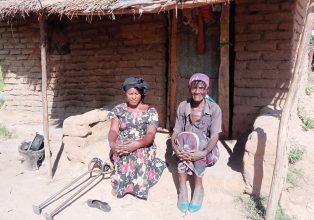Relax abortion laws, activists
In July 2018, a 15-year-old girl disguised as Joy was defiled by a businessman almost thrice her age.
The girl, who lives in Mulanje, recalls being slapped three times by the 41-year-old man, who was close to her in-law.

“He locked me in a room and forced himself on me. I resisted vehemently, but he overpowered me,” she narrates.
A month later, Joy was found pregnant.
“When I told my aunt, she asked me to look for K8000 and took me to a certain woman in our village who inserted a small stick into my private parts. It stayed there for two days and then I started experiencing stomachaches and bleeding heavily,” she said.
Joy reported the issue to her grandmother, who later took her to the nearest health centre, which referred her to Mulanje District Hospital.
Her aunt, who took her to the elderly woman to terminate the pregnancy, says she felt that Joy was too young to give birth, especially after being assaulted.
She opted for a clandestine “shortcut” because abortion remains illegal in Malawi unless a woman’s life is in danger.
As the campaign to expand access to safe abortion continues, some clergy and youth activists want Parliament to discuss the grounds proposed in 2015 by the Special Law Commission on the Review of Abortion Law.
In 2021, Chiradzulu West lawmaker Mathews Ngwale volunteered to table a private member’s bill for Parliament to debate the proposed liberalisation of safe abortion but withdrew it amid religious backlash from some lawmakers.
Reverend Martin Kalimbe of Nkolokoti Anglican Parish says parliamentarians needed not to attach their religious and cultural beliefs to the dilemma that claims up to 18 lives in every 100 pregnancy-related deaths.
“Looking at the sexual and reproductive health evidence, what is stopping Parliament from discussing the Termination of Pregnancy Bill remains unclear,” he says.
If passed, the proposed grounds will allow health workers to terminate a pregnancy if it endangers a woman’s life, to prevent injury to her or mental health, where the fetus is severely malformed to be compatible with life and where it results from rape, incest or defilement.
“Can you keep in your house a pregnancy or a baby knowing your wife or daughter was raped by robbers? Do you understand the torture both the pregnancy and the child to be born will bring to the family,” asked the Anglican priest.
Penelope Paliani Kamanga, a journalist and gender rights expert, says it is surprising that Parliament seems not interested in giving women the right to terminate pregnancies when keeping it would be unfavourable to them.
“A decision about one’s body is yours alone,” she says, dialling women’s bodily autonomy and integrity rights.
She adds: “We cannot keep pretending that women are not conducting abortion because the law and religious teachings are restrictive.
“The more abortion remains illegal in Malawi, the more unsafe abortion and maternal deaths are happening at the hands of unskilled people. This is human rights violation to them.”
Youth activist Patricia Manyengo wants safe abortion legalised, saying the restrictive colonial law pushes women to preventable deaths.
“Government is spending a lot of money offering post abortion care, so legalising safe abortion means saving lives. If subjected to rape or incest, we should be protected by the law if we choose not to keep the pregnancy,” she says.
To Manyengo, liberalising or decriminising abortion does not mean that every pregnant woman will resort to abortion.
“Those without valid reasons to abort won’t,” she states.
The woman Joy’s aunt consulted in Mulanje claims to have conducted backstreet abortions for over 30 years now.
This reporter brought her a female workmate he claimed to have impregnated. The ghost couple insisted they wanted to abort.
The unskilled service provider asked them to pay K7 500 for the secret procedure and claimed to have assisted numerous girls as young as 12.
“Some of them were Standard Four and Five girls,” she bragged.
Then she turned to us: “I will just give your girlfriend some concoctions and sticks to insert into her private parts. Hours later, she will start bleeding as if she is menstruating and everything will be history.”
Simple as it sounds, clandestine abortions result in deaths, injuries, disabilities and other complications that left Joy battling for her life on a sickbed.
Doctors say due to fear of imprisonment and shame, most patients seek medical treatment in life-or-death situations.
In 2009, studies by the Ministry of Health and its partners showed that Malawi spends about K1.3 billion treating post-abortion complications.
Ngwale, who heads Parliament’s Health Committee, wants change. n
This article has been produced with support from the Centre for Solution Journalism.




